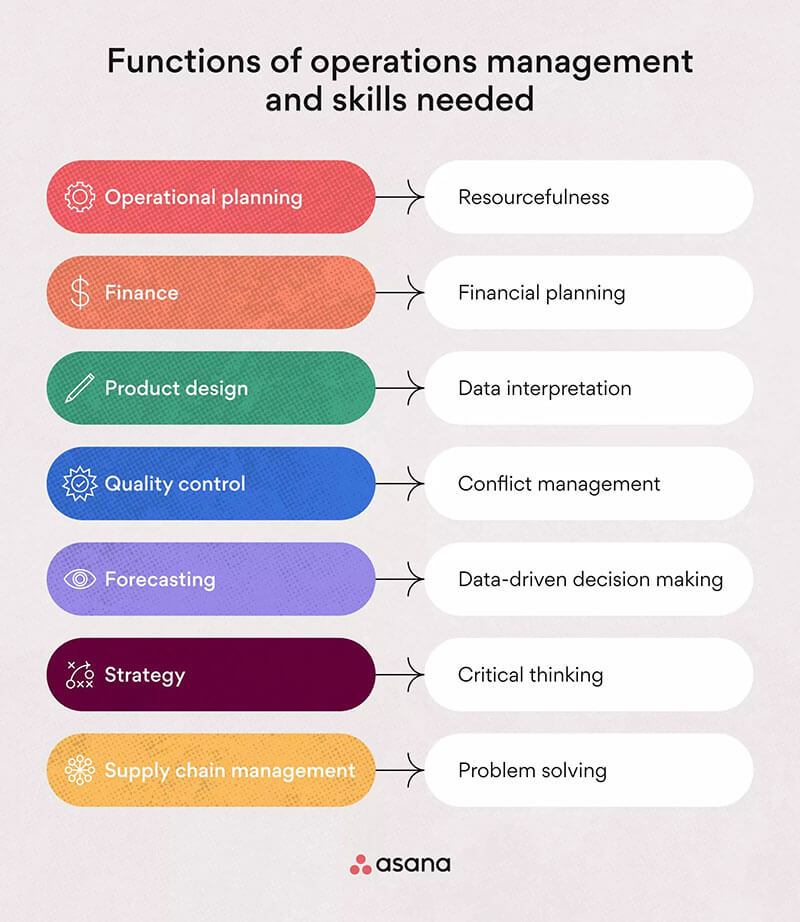Key Functions of Operation Management in Business Operations

Many things happen inside your business to drive success and growth. From choosing the right staff members to ensuring the goods you put out are of the highest quality. The daily tasks or activities that are conducted in your company are referred to as business operations management, which focuses on optimizing core activities to enhance efficiency, reduce costs, and improve both customer and employee experiences.
Each operation is critical in helping your business increase revenue and consistently strive toward better growth. This article discusses business operations and the essential functions you need to understand.
What Are Business Operations?

Let’s first consider what business operations are and what the term means. It’s an umbrella term that can refer to several operations within an organization. You’ll have business operations regardless of your industry. If you focus on product design, manufacturing, retail, or service provision – each business type still has operations that affect growth and performance. A business operations strategy integrates key elements such as people, processes, technology, and location to align operational capabilities with business objectives, thereby facilitating growth and competitive advantage.
Manufacturing companies usually have more business operations to focus on than retail ones. Your operations usually start with the raw materials used in production. However, if you have a retail store, your operations start by buying products that manufacturing companies make. Thus, you cut out a couple of the steps or operations. Likewise, things will also be a bit different if you’re in the service industry or supply chain.
Today, some businesses are also attempting to automate specific operations departments. This helps to speed up the process of working with data, providing good customer service, and more. One survey found that 31% of companies have already automated one or more functions within the business.
Definition of Business Operations
Business operations refer to the core activities that a company performs to generate revenue and achieve its goals. These activities encompass the production, distribution, and delivery of products or services, as well as the management of resources such as personnel, equipment, and technology. Essentially, business operations are the backbone of any organization. Their efficiency and effectiveness can significantly impact the company’s overall performance and success. Whether you are running a manufacturing company, a technology company, or a service-oriented business, understanding and optimizing your business operations is crucial for sustained growth and profitability.
Importance of Business Operations
Business operations are essential for the success of any organization. They enable companies to produce and deliver high-quality products or services, manage their resources effectively, and respond to changing market conditions. Efficient business operations can help companies reduce costs, improve productivity, and increase customer satisfaction, ultimately leading to increased revenue and profitability. Moreover, business operations play a critical role in ensuring compliance with state and federal laws, as well as maintaining quality control and supply chain management. By focusing on optimizing these operations, businesses can create a robust foundation for long-term success and adaptability in a competitive market.
The Key Functions Of Operations Managers
When successfully managing your business, you need to understand the key functions of operations management. A successful operations manager must possess a blend of both hard and soft skills to effectively oversee multiple departments. You can break business operations down into multiple categories, which makes it easier to see how your business performs and how effective your operations management strategies are. We are going to discuss some of the most common business operations that company owners and management staff generally focus on.

Planning
With the right goals in place, it’s easier to do quality control and to understand how your business is doing. A business operations strategy integrates key elements such as people, processes, technology, and location to enhance overall efficiency and productivity. This is why planning operations play a crucial part in any company. Whether you are part of the supply chain, offer custom-built products on customer demand, or have a retail store, you need a clear vision and know what you want out of business.
You’ve already gone through the process of setting up a business plan. This, however, does not mean planning is no longer necessary. Planning for projects you want to take on, changes you want to make in the business, and how services or products are delivered to your customers – these processes affect how effectively you can execute your business operations. Strategic planning also ensures staff members know their roles and the tasks they should perform. It’s also a great way to ensure everyone from the human resources team to the sales department has specific goals they need to reach.
Quality Control
Being in control of your business is important. You need a broad view of what’s happening in every department and how well the business performs. This is where controlling operations come into the picture. Controlling involves monitoring your business and using strategic management strategies to measure progress and performance.
When there are problems in the business, or you notice that teams fail to meet their quota, it’s your responsibility to pinpoint the fault at hand. You are in control of implementing the changes necessary to rectify problems you notice while assessing business strategies and internal operations.
Staffing
Your business relies on the people who work for it. Keeping your business running without any hurdles is hard without the proper staff members. The marketing department plays a crucial role in aligning resources effectively to meet specific operational goals. Staffing operations also play a crucial role in overall business management.
Staffing involves hiring the right people qualified for the specific positions that need to be filled. Additionally, it also involved ensuring the suitable teams are formed with staff members who can work together effectively. When you notice a learning gap among your staff members, business operations should also provide the appropriate training to ensure they can do their work without failure.
Organization
The operations manager needs to ensure the created plans can be implemented. This is where the organization comes into the picture. Operations departments must ensure tasks are handed down to the right teams and resources are adequately distributed.
This helps to keep everything functioning the way it should. A well-organized business also has an easier way of ensuring customer satisfaction.
Directing
Another part of business operations is directing. Different management staff members can perform this particular operation. Directing employees means telling them exactly what they need to do and what a project expects of them. It can also include the announcement of goals the employees need to achieve, such as a specific sales number you expect from each employee within a given timeframe.
Directing also helps to add stability to the internal operations of your business.
Types of Business Processes
Business processes are the series of activities performed to achieve a specific goal or objective. There are several types of business processes, each contributing uniquely to the overall functioning of a company:
- Production Processes: These involve the creation and assembly of products, including manufacturing, quality control, and packaging. Ensuring these processes are efficient is vital for maintaining product quality and meeting customer demands.
- Distribution Processes: These cover the movement of products from the production facility to the customer, including transportation, warehousing, and inventory management. Effective distribution processes ensure timely delivery and customer satisfaction.
- Marketing Processes: These involve the promotion and sale of products or services, including advertising, sales, and customer service. Strong marketing processes help in building brand awareness and driving sales.
- Human Resources Processes: These include the management of personnel, such as recruitment, training, and benefits administration. Efficient HR processes ensure that the company attracts and retains the best talent.
- Financial Processes: These involve the management of financial resources, including accounting, budgeting, and financial reporting. Sound financial processes are crucial for maintaining the financial health of the company.
By understanding and optimizing these various business processes, companies can achieve their strategic goals more effectively.
Role of a Business Operations Manager
A business operations manager is responsible for overseeing and coordinating the day-to-day activities of a company. This includes managing business processes, supervising personnel, and ensuring that the company operates efficiently and effectively. Business operations managers play a critical role in ensuring that the company meets its goals and objectives. They are often responsible for identifying areas for improvement and implementing changes to increase productivity and reduce costs.
Some of the key responsibilities of a business operations manager include:
- Developing and Implementing Business Operations Strategies: Crafting strategies that align with the company’s goals and ensure smooth operations.
- Managing Business Processes: Ensuring that all business processes are efficient and effective, from production to distribution.
- Supervising Personnel: Overseeing staff to ensure they have the resources and support needed to perform their jobs effectively.
- Analyzing Data: Using data to identify areas for improvement and making informed decisions to enhance operations.
- Implementing Changes: Introducing changes to increase productivity and reduce costs, ensuring the company remains competitive.
- Ensuring Compliance: Making sure the company adheres to state and federal laws, as well as maintaining quality control and supply chain management.
Overall, business operations managers are essential for driving growth and profitability. Their skills and expertise ensure that the company runs smoothly and efficiently, adapting to changes and continuously improving its operations.
Improving Business Operations Management
As a business owner, you expect your company to see consistent growth. This can only happen with proper operations management. Supply chain management strategies play a crucial role in enhancing business operations and efficiency. When you do not have a system in place for your business operations, it can be hard to attend to your company’s requirements.
Improving operations management is definitely something that companies should strive toward consistently. This starts with regularly checking in on the operations manager and understanding how current operation management strategies work.
Measuring performance is very important in any business. You should not only measure the performance of your sales and revenue but also analyze your internal operations regularly. Your company goals must be accurate and actionable – this improves productivity and helps avoid confusion among your employees. For example, it’s easier to measure a goal of increasing sales by 50% within 12 months than simply telling your sales teams that you want to make more money.
Apart from performance measurement, here are other tips to help with the improvement of your business operations:
- Look at ways in which you can streamline the processes of your business. Take advantage of automation systems where you can. This can help you reach business goals as you’ll free up time for employees in critical positions.
- Use critical thinking when it comes to decision-making. Keeping up with industry trends will help you have more data to use when aiming at increasing efficiency as your business grows.
- Consider using elements like gamification to reach production goals more effectively. Gamification can save money in the long run, as the system often provides integrations that automate sales recording and reporting. It’s also a great way to motivate employees to perform their duties without delay.
It is also essential to consider the fact that your business is unique. You can take a look at the operations management strategies that competitors use. This gives you data that can be used to give your company a competitive edge but do not copy their strategies. Use the data you collect as inspiration to help you put out a quality product or service while also improving the internal processes and operations that allow you to achieve the goal.
Maximizing Success Through Operations Management
Effective operations management is a powerful tool that empowers businesses to optimize their daily activities, enhance productivity, and meet strategic goals. From careful planning to quality control and efficient staffing, each function within operations management plays a vital role in keeping a business competitive and adaptable.
Throughout this article, we’ve explored the diverse facets of business operations management, showing how strategic decisions in areas like planning, organization, and process improvement can lead to measurable success. When businesses commit to refining their operational workflows, they unlock the potential to reduce costs, increase employee satisfaction, and enhance customer experiences.
Furthermore, with continuous advancements in technology, businesses today have unprecedented opportunities to automate routine tasks, streamline communication, and boost efficiency. This commitment to improvement—along with a proactive approach to measuring performance and adapting strategies—ensures businesses stay agile and resilient in a competitive market.
Ultimately, by integrating robust operations management practices, businesses don’t just operate; they thrive. Each improvement reinforces the company’s foundation, driving long-term growth, profitability, and sustainable success.
Put those insights into practice.
Set your team up for success by improving their performance through gamification.
Back to blog








